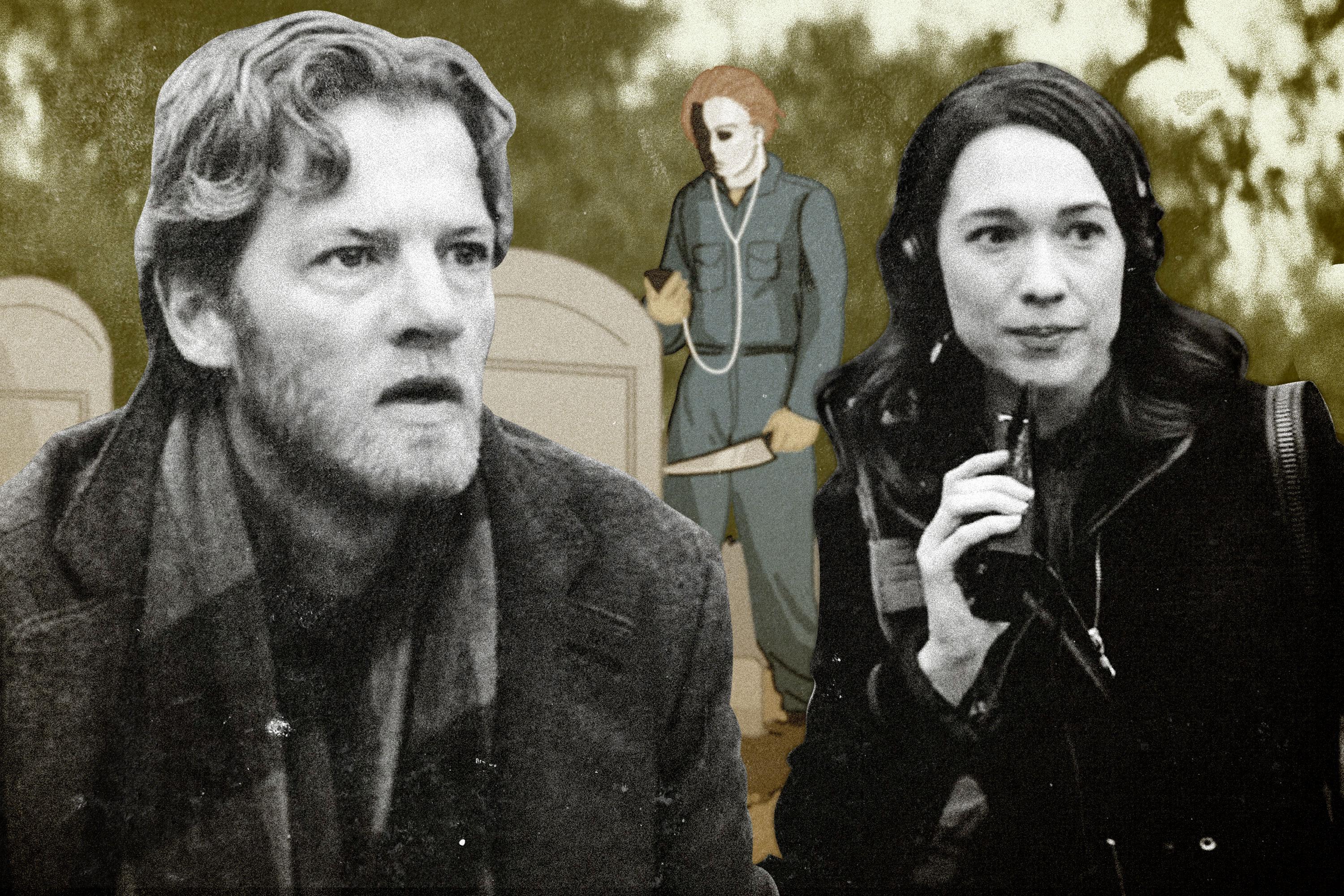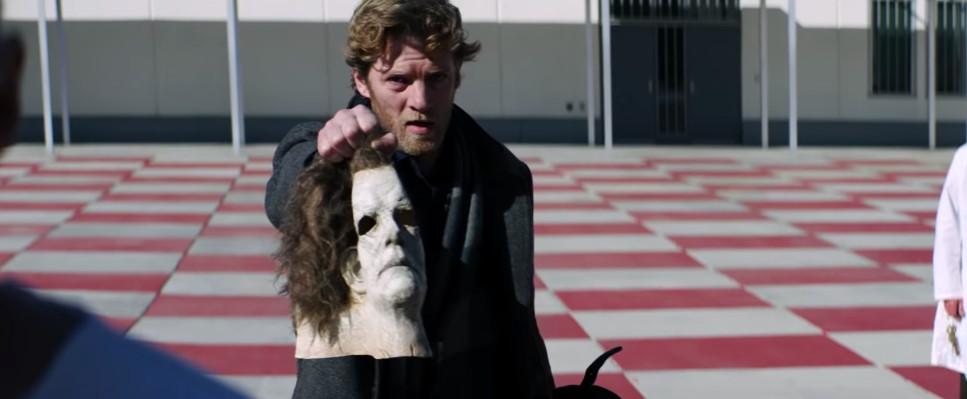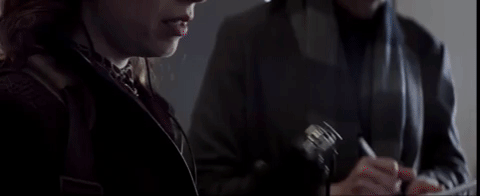

Halloween, a sequel to 1978’s groundbreaking horror movie of the same name, wants you to know that it takes place in the immediate present. Which is why two characters in the movie are making a podcast.
The podcasters are Aaron Korey (Jefferson Hall) and Dana Haines (Rhian Rees), a British couple who, according to themselves, are “award-winning” “investigative” journalists who “reexamine murders from an unbiased lens.” They’ve come to Haddonfield, Illinois, to do some unbiased reexamination of the night 40 years ago when Michael Myers went on a killing spree. Aaron and Dana do not say what their podcast is called, but I’m guessing the title is Almost Serial.
All jokes aside, this story line makes sense. The depressing truth is that print media is dying. Only a handful of publications have the resources to send a pair of full-time reporters to small-town Illinois to do a lengthy expose on a killer who’s been behind bars for four decades—not to mention one who doesn’t speak and can’t provide a juicy pull quote. Meanwhile, podcasts are so damn hot right now. (Have you heard of The Ringer’s vast, excellent network of podcasts? We even have one on the Halloween franchise.) More specifically, true-crime podcasts are so damn hot right now. The genre has proved to be a lucrative space, with several pods achieving a level of fervor and cultural relevance that’s hard to attain in the increasingly fractured world of entertainment. So yes, it is believable that a couple of intrepid pod producers would endeavor to do a longform podcast on Michael Myers.
The real question is: Are Aaron Korey and Dana Haines actually good podcasters? [Hits record on Tascam, uses cool, breathy radio voice.] By looking at some technical and ethical aspects of the job, with valuable input from The Ringer’s senior podcast producer Zach Mack, I set out to answer that question.
Choosing Subjects
Michael Myers is an iconic serial killer, but he’d never be mistaken for having an excess of personality. Freddy Krueger does a decent amount of shit-talking and wears an Urban Outfitters sweater; Hellraiser took the time to put all those needles in his face; Myers, on the other hand, is notorious for never saying a word and wearing a generic jumpsuit and mask. The terror comes from the fact that he’s just a menacing blank slate (with zero fashion sense). For that exact reason, Myers would be a terrible primary interview subject for a podcast. That Aaron and Dana seem not to know this suggests one of two things: that the duo possesses a fundamental misunderstanding of what podcasting is, or that, as Mack concludes, the duo is terrible at research. “Anyone who knows anything about Michael Myers knows that he is nonverbal,” Mack says, aggrieved.
Podcasting is an aural medium. It’s not like you can just sit Myers down in front of cameras and let his vacant stare creep the shit out of viewers. Aaron and Dana are expecting a lot if they think their main subject will break his silence after several decades just to do a podcast. Following 40 years in asylum, Michael Myers probably doesn’t even know what a podcast is. The guy did not listen to Crimetown. That said, it would have been mind-blowing if he just put on some headphones and said, “First time, long time.”
Gaining Access
When Aaron and Dana first approach Laurie Strode (Jamie Lee Curtis), she doesn’t even let them through her front gate—not even after Dana clarifies that by “making a podcast” Aaron means “we’re investigative journalists.” Only when Dana offers Laurie a bribe of $3,000 does she welcome them inside. Ethically speaking, this is a huge no-no. Very un-Serial behavior, you might say.
“Serial is the reason most of us podcast producers have jobs,” Mack says. “But c’mon, these guys aren’t the same caliber of journalist. I witnessed enough cut-corner journalism to make Sarah Koenig and Ira Glass kill a story faster than you can say ‘Best Buy Parking Lot.’”
Interviewing Subjects
Bribery aside, Aaron and Dana’s interview with Laurie—the second most important interview subject for this podcast, if not the most important—is extremely surface-level. Aaron and Dana don’t make any new discoveries and don’t touch on anything that wouldn’t already be on Michael Myers’s Wikipedia page. The interview is also hella short. They talk for, like, three minutes over a cup of tea (so, $1000 dollars per minute).
Worst of all, Aaron and Dana want Laurie to confront Michael Myers on their pod for some sweet, viral content. And they tell her this! They plead with a serial killer’s one surviving victim to let them put her in the same room as the guy. She’s not about that, and the mere mention of the idea is what leads to the interview being cut so short.
Now consider what happened at the asylum. Unable to get Myers to speak, Aaron whips out the killer’s old, raggedy William Shatner mask from his bag, hoping it’ll cause a stir. He got the mask from “a friend at the DA’s office,” you see, because a renowned British podcaster would absolutely have an integral source in Illinois willing to give him an iconic piece of evidence so that he could toss it to the ground. Now, does this look like good field reporting for a podcast to you?

Overall, Aaron and Dana fail to get both of the main characters to participate in their podcast. As Mack puts it, “The only thing that suggests Dana and Aaron are good at their job is that they were somehow able to be granted special access to Michael Myers in the asylum.” Again, I’m sure they just had some really great Illinois hookups.
Recording
Here’s the thing about podcasts: They need to sound good. It’s a major thing that award-winning podcasters Aaron and Dana don’t give a FUCK about. This Michael Myers podcast would be a torment to listen to. They record some of their narration in the car—while driving! Aaron talks into a mic while sitting on the ground of a very windy cemetery. They attempt to record in a holding room in an asylum, a place that makes really loud, interruptive noises every time a door is opened.

Great job, guys, you just ruined another monologue!
“Gathering tape or ambient sound or some narration, or doing interviews in the field is acceptable, but that’s not what Dana and Aaron are doing,” Mack says, growing increasingly agitated. “They are just tracking their vocals. At one point they are reciting scripted dialogue just out in the open. Scripted narration is recorded in the comfy confines of the studio because it’s a controlled environment and, again, it’s scripted! Nothing of note is happening where they are recording, so why compromise the audio?”
Audio is a tricky thing to capture proficiently, and these two just pressed record whenever and ran with it, with very little regard for the proper practices. Even if Aaron’s narration was full of poignancy and pathos (it wasn’t), the listener likely would’ve been distracted by the absurdly present sounds of a running engine, or the crinkling of leaves. “Go back to the studio, track your overly dramatic vocals there, and then throw some ambi underneath it like any intern is taught to do Day 1,” Mack suggests, openly offended by Aaron and Dana’s malpractice.
The Final Verdict
Aaron and Dana are a negative representation of true-crime podcasters who consistently skirted ethical and audio considerations without much in the way of logic. Their monologuing was pretentious; they didn’t ask hard-hitting questions; they tossed a mask at Michael Myers; they filled their podcast with the sweet sounds of asylum alarms.
Almost Serial gets one out of five stars from me—the one star because British accents are very fun to listen to. Mack, however, is less enthused: He concludes that the podcasters in Halloween were “not satisfactory.”

